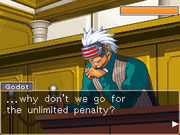- You may be looking for punishments imposed on convicted criminals, which can be found in the article legal system.
In the Ace Attorney series, a penalty is generally used to punish incorrect deductions. Depending on the game, this can be represented in the form of damage inflicted on a "health" meter — called the Confidence Gauge or the Truth Gauge depending on context — or suffering a strike in a five-strike system. Depleting the gauge or running out of strikes is the usual way in which the player can lose and suffer further consequences depending on the context. In some instances, instant Game Overs and bad endings can be triggered independently of this penal system.
Original system
In trials, a penalty signifies a sanction issued to a lawyer for one of a variety of reasons, usually due to breaking a rule or presenting irrelevant evidence. Running out of strikes or depleting the gauge during a trial results in a Game Over; the judge renders a guilty verdict, saying that he has lost his patience with the defense and has decided that there is no further case to be made against the prosecution. In some ways, this explanation is largely a relic of the first game, and does not take into account variations in penalties in subsequent games. The prosecutors, while unplayable, can receive penalties of a sort for plot-related reasons, though these instances are extremely rare and meted out for particularly serious offenses.
Phoenix Wright: Ace Attorney uses a strike-based penalty system, visually represented by stylized blue exclamation marks on the screen. Phoenix Wright starts with five and loses one for every penalty received. The usual way to receive a penalty is by presenting irrelevant evidence on a witness's statement during a cross-examination. In addition to this, Wright is often called to answer questions or present evidence to prove one of his claims. In these instances, the strikes that the player has remaining are shown, signifying that a penalty will be dealt out for an incorrect choice. Notably, in Turnabout Goodbyes, refusing to cross-examine Lotta Hart at any point after Maya Fey is arrested for contempt of court will lead to an immediate guilty verdict. The strikes are replenished at the end of each act, including the segments of trials in Rise from the Ashes.
Variable Confidence Gauge

Prosecutor Godot threatens the depletion of the entire Confidence Gauge in Bridge to the Turnabout.
Phoenix Wright: Ace Attorney: Justice For All introduced the "Confidence Gauge" as an 80-pixel-long "health bar" for the purpose of variable penalties. In this system, the judge can give penalties in various degrees of severity depending on the seriousness of the attorney's accusations or a deal made between the attorney and the judge or prosecutor. Presenting irrelevant evidence during a cross-examination to interrupt a witness results in a penalty equal to 20% of the gauge, equivalently to the penalties in the five-strike system. This system was also adopted in Phoenix Wright: Ace Attorney: Trials and Tribulations and Apollo Justice: Ace Attorney. In these games, penalties are usually dealt in multiples of 5% of the gauge, except in Apollo Justice: Ace Attorney, in which they are dealt in multiples of 20%.
In addition to penalties incurred by presenting irrelevant evidence, pressing certain witnesses on certain details can also incur a penalty, as a result of circumstances surrounding the witness in question. For example, Moe and Furio Tigre will crack jokes or fly into a rage, respectively, when pressed on irrelevant details, thus wasting the court's time.
People in the courtroom are aware of the Confidence Gauge and can show the extent of the penalty they want to give on it. Prior to making a pivotal decision, the attorney is usually made aware of the severity of the penalty that will be dealt if he or she chooses incorrectly. This is not reliable, however, as often no indication of an impending penalty is made. In fact, in Turnabout Big Top, the penalty warning is misleading, with the penalty being less severe if Wright answers that he "can't prove it" during Moe's first testimony, and double the shown penalty if he says that the murder weapon is hidden in the judge's bench.
The Confidence Gauge was also introduced into investigation acts, in which it is used to denote Phoenix Wright's "spirit health" when using his magatama to break Psyche-Locks. If Wright presents the wrong evidence while trying to break someone's Psyche-Locks, he suffers damage to his spirit, the extent of which depends on the nature of what Wright is trying to prove. If his "spirit health" is depleted, the lock-breaking process immediately terminates. However, this does not result in losing the game, and Wright is free to attempt to break any person's Psyche-Locks, albeit with virtually no health.
The replenishment of the Confidence Gauge is treated somewhat differently across games. In Justice For All, the amount of "confidence" that Wright has carries over to every act in an episode and can only be replenished by breaking a character's Psyche-Locks, which recovers 50% of the Confidence Gauge. In Trials and Tribulations, however, the Confidence Gauge is replenished at the end of a trial or an investigation but not at the end of an act during an investigation or trial, separating trial penalties and spirit penalties. In Apollo Justice: Ace Attorney, the Confidence Gauge is replenished at the end of each act, including acts that end in the middle of a trial.
Truth Gauge
Ace Attorney Investigations: Miles Edgeworth and Gyakuten Kenji 2 use the "Truth Gauge", which is used similarly to the Confidence Gauge of the previous games. Incorrect deductions in logic or arguments produce penalties on this gauge, signifying that Miles Edgeworth is getting further away from the truth of a case. The consequence of depleting the Truth Gauge results in a Game Over sequence similarly to losing in the main series's trials, with the witness he is talking to losing patience and walking away. The game ends with Edgeworth's organizer being closed, followed by the statement: "Thus the truth was lost for all eternity." In both games, the Truth Gauge is replenished by 50% upon completing an investigation.
The first game's Truth Gauge is much less flexible than the Confidence Gauge, with all penalties cutting 10% except for one argument in Turnabout Ablaze, in which pressing or presenting incorrect evidence cuts 20% from the gauge. However, the end of each investigation can replenish 50% of the bar. In Gyakuten Kenji 2, penalties have slightly more variability, being dealt in multiples of 5% with a maximum of 50%. Wrongful rebuttals again usually result in 20% penalties, though like the game before it, there is an exception in an argument in The Grand Turnabout, which increases the stakes to 40%. Failing a round of Logic Chess results in a 5% penalty, while successfully completing it restores 50% of the penalty meter.
Return of the strike system
| This article contains information about Ace Attorney media that has been released only in Japan. | |
|---|---|
|
The information in this article comes from a game, demo, or other media that has been released in Japan, but not in any predominantly English-speaking country. The subject of this article has not been officially revealed for English versions of this media. English versions of this content are only available through unofficial translations. More information on this can be found here. If you have personal experience with the item of media in question, you can help the Ace Attorney Wiki by improving on this article. Please heed the manual of style when adding information. | |
| This article contains information about Ace Attorney media that is currently in production. | |
|---|---|
| Content may change substantially as more information becomes available. Please do not add pure speculation to this article. When adding information, if it's not already mentioned in an external link, please provide a source using <ref></ref> tags. | |

Phoenix Wright: Ace Attorney: Spirit of Justice revives the "five-strike" penalty system.
With the series's transition to the Nintendo 3DS came a return to the five-strike penalty system from the first game, with different graphics used each time. Professor Layton vs. Phoenix Wright: Ace Attorney uses the exclamation marks from the first game for the chapter English Turnabout, but once the setting changes to Labyrinthia, the strikes are represented instead by shields bearing the insignia of the Labyrinthian knights. At the end of each trial, any remaining strikes are converted into picarats, the staple point system of the Professor Layton series. Phoenix Wright: Ace Attorney: Dual Destinies uses the Confidence Gauge in trials, but it almost never deviates from 20% penalties with the exception of one question near the end of Turnabout Academy, and does not use the gauge in investigations even with the magatama and Apollo Justice's bracelet. In both of these games, trials are started with all strikes, which are not replenished between trial acts taking place on the same day. Dai Gyakuten Saiban: Naruhodō Ryūnosuke no Bōken and Phoenix Wright: Ace Attorney: Spirit of Justice also use the strike system, with the former using the spark from the game logos, and the latter using mitamah or attorney's badges.[1] With the exception of Professor Layton vs. Phoenix Wright: Ace Attorney, should the player lose, the player is given the opportunity to start again at the point where he or she failed, or go back to the title screen.
Dai Gyakuten Saiban also uses strike-based penalties for Joint Reasoning. If all strikes are used up during Joint Reasoning, the player is given the option to restart from Sherlock Holmes's initial reasoning or from the beginning of Ryūnosuke Naruhodō's rebuttal. In addition, during the finale of The Adventure of the Unbreakable Speckled Band, the player is penalized for presenting incorrect evidence; failing here will result in a short conversation with Holmes and the game looping back to the beginning of the finale.
References
- ↑ CapcomChannel. (2015-09-18). "【TGS2015最速アップ】逆転裁判6 SPステージ". YouTube. Retrieved on 2015-09-20.


